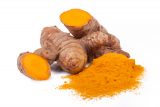
WHAT IS THE TURMERIC CRAZE ALL ABOUT?
As an antioxidant, polyphenol, and bioactive component of turmeric, curcumin has surely made a name for itself(1).
More than 300 bioactive compounds have been identified in turmeric but curcumin, is the most widely studied(2). Yet, turmeric is only 2-6% percent curcumin by weight, so the levels of curcumin in turmeric are not nearly as high as the doses tested in most studies. In addition to its low concentration, curcumin has a poor absorption rate(2).
Ready for the good news? Current research has explored the chemical and metabolic properties of curcumin to improve its bioavailability. With that came the patented and registered formulation of curcumin BCM-95®, a total curcuminoids complex with both enhanced bioavailability and sustained retention time in the body. Such a formulation can be found in Health Thru Nutrition’s Curcu-Gel Ultra, providing 650 mg of BCM-95®.
INFLAMMATION AND THE BRAIN
Acute and chronic inflammation play a pivotal role in various medical conditions and diseases, such as the progression of obesity, type 2 diabetes, cancer, pancreatitis, arthritis, neurodegenerative, cardiovascular, and metabolic diseases(3).
A recent publication from March 2018 found that daily ingestion of curcumin in 50-90-year-old adults led to significant benefits in memory and attention—with memory scores improving 28% over 18 months.
“Exactly how curcumin exerts its effects is not certain, but it may be due to its ability to reduce brain inflammation, which has been linked to both Alzheimer’s disease and major depression,” said Dr. Gary Small, the study’s first author(4).
Aside from curcumin’s cognitive benefits deriving from its anti-inflammatory brain effects, it may also be attributed to its antiamyloid effects(4). Amyloid plaques are the sticky buildup of proteins that accumulate outside nerve cells. When the protein folds improperly, it forms amyloid deposits that are associated with brain inflammation. Therefore, in this particular study participants with daily curcumin showed less amyloid activity in the brain than those without daily curcumin. These specific regions of the brain are known as the amygdala and hypothalamus, which control several memory and emotional functions.
CANCER
Aside from its role in promoting mental health among aging adults, curcumin has also been studied for its role in the treatment of cancer. Statistically, cancer occurs in 14.1 million people in the world annually. In the last few decades, more than 10,200 research publications and 258 clinical studies have been conducted to investigate the relationship between curcumin and cancer(5).
A 2016 review article determined that the anticancer effects of curcumin are multi-targeted in nature. “It can modulate all kinds of cancer hallmarks, including cell proliferation, cancer signaling pathways, transcription factors, tumor angiogenesis, and metastas”(5). With that being said, Pandima Kasi and colleagues concluded that curcumin could be used for the treatment of different types of cancer(5).
ARTHRITIS
Adding to the list of benefits, a 500 mg dose of curcumin in the form of BCM-95® was found to significantly improve disease activity and severity of inflammation in patients with rheumatoid arthritis(6).
Research was also conducted in middle-aged patients with osteoarthritis, demonstrating significant improvements in pain scores and range of movement, after ingesting a 500 mg BCM-95® and Boswellia serrata formulation(7).
SAFETY
Aside from its benefits, research has also explored the safety of curcumin. The USDA has approved curcumin as a “Generally Regarded As Safe” compound and the daily intake of curcumin at a dose of 0.1-3 mg/kg body weight has been considered an acceptable dose by the Joint FAO/WHO Expert Committee on Food Additives (1996)(1).
References
(1) Ghosh S, Banerjee S, Sil PC. The beneficial role of curcumin on inflammation, diabetes and neurodegenerative disease: A recent update. Food and chemical toxicology. 2015; 83: 111-124.
(2) Moore HG, Spiro A. Can turmeric really prevent cancer? British Nutrition Foundation. 2017; 42: 141-147.
(3) Shehzad A, Rehman G, Lee YS. Curcumin in inflammatory diseases. BioFactors. 2013; 39(1): 69-77.
(4) Small GW, Siddarth P, Li Z, et al. Memory and Brain Amyloid and Tau Effects of a Bioavailable Form of Curcumin in Non-Demented Adults: A Double-Blind, Placebo-Controlled 18-Month Trial. The American Journal of Geriatric Psychiatry. 2017; 26(3): 266-277.
(5) Kasi PD, Tamilselvam R, Wozniak KS, et al. Molecular targets of curcumin for cancer therapy: an updated review. Tumor Biol. 2016; 37: 13017-13028.
(6) Chandran B. A Randomized, Pilot Study to Assess the Efficacy and Safety of Curcumin in Patients with Active Rheumatoid Arthritis. Phytotherapy Research. 2012; 26(11): 1719-1725.
(7) Kizhakkedath R. Clinical evaluation of a formulation containing Curcuma longa and Boswellia serrata extracts in the management of knee osteoarthritis. Molecular Medicine Reports. 2013; 8(5): 1542-1548.
Written by Nicole Lindel ~ Nutrition Education Master’s Student at Columbia University
